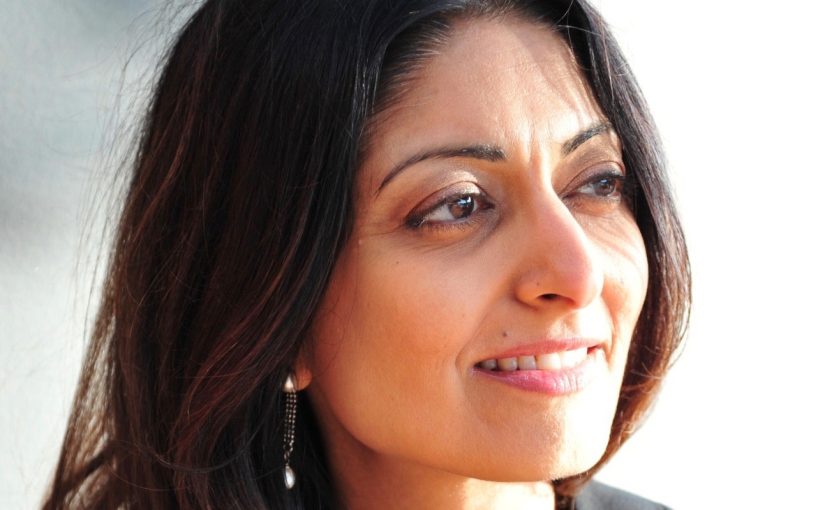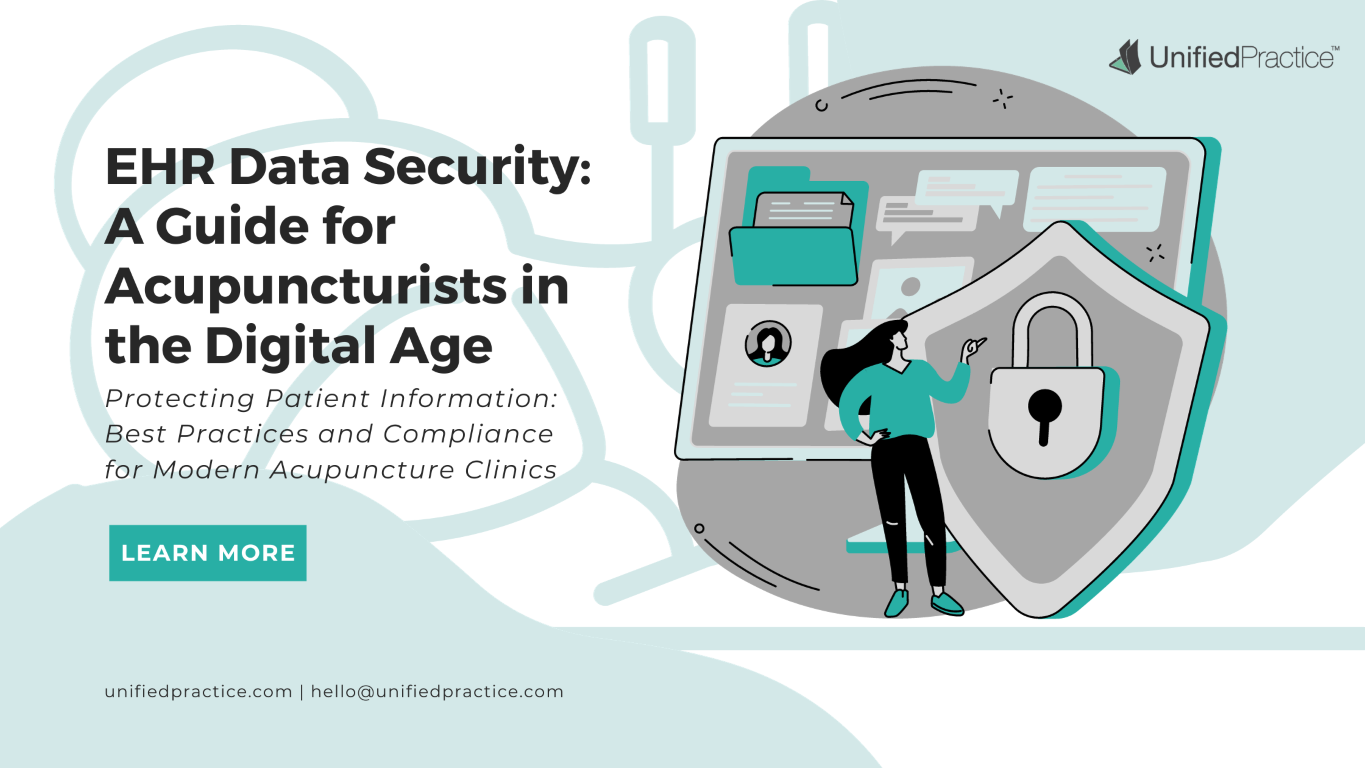We created Clinic Spotlight to share real-world examples of TCM clinics working to grow their business and improve their patients’ experiences.
The following interview is with acupuncture practitioner Dr. Priya Advani. She operates the Advani Center in Los Angeles, California, and streamlines her practice using Unified Practice’s acupuncture practice management software.
You spent the early years of your career working as an account executive before studying TCM. What was the catalyst for you to make a career switch?
It was a life-altering career switch. Actually, I was thinking about this the other day. When I was in high school I wanted to be a doctor — that was my vision. I had it all planned out: I was going to go to medical school and I wanted to specialize in treating premature babies and working with kids. But, by the time I got to my senior year, I realized everything it would take, including all the schooling. Ironically, later in my life, I ended up spending seven years on my graduate and doctoral studies.
My mom was in marketing so I decided to focus on business. I thought it would be great because I love the creativity in marketing, so that’s what I decided I was going to do. I got my Bachelor’s of Science degree in marketing and had that career for many years. Then, I had my daughter. I was in this career I was very successful in — I was one of the top account executives in the company and was doing really well, but I wasn’t happy. Something in my life was missing. After my daughter was born, I re-evaluated my life and purpose. I spent a year raising my daughter and then I got antsy. I wanted to do something that created more meaning in my life and decided it was time to make a switch, so I started looking into holistic medicine — again, going back to the healing arts. That’s how I ended up switching my career.
As you were weighing your options, what was the hardest or scariest part about making the switch?
Near the end of my corporate career, I was six months pregnant and I ended up getting laid off. I had just gotten back from an all-expense-paid trip to Hawaii I earned, had won a BMW, and was one of the top leaders in the organization, so it was devastating. As far as being afraid, I wasn’t really afraid to make a change, I was kind of relieved. I just had to think about what I really wanted. When my daughter was born I couldn’t work crazy hours anymore, and I wanted to do something that had meaning. At the time, I was married and had financial security as my husband was an attorney, so for me, there really was no fear of making a change.
At first, I was looking into ayurvedic medicine. Randomly, I ran into a friend at a bookstore and invited him to my daughter’s first birthday party and his mom happened to be in town so he asked if he could bring her. I thought his mom studied Ayurvedic medicine so I thought, “Oh, this will be great! I can brainstorm with her.” What I found out is she studied Chinese medicine in China. She told me not to study ayurvedic medicine at first because it’s a certification course. She recommended I look into Chinese medicine because it’s a licensing program and I could always go back later and do a course in ayurvedic medicine. At the time, I didn’t really know much about acupuncture, so I started researching and looking into some schools she mentioned. I went to Emperor’s College and just loved it. The program that I chose did a good job integrating western medicine with eastern medicine, which is really what I found interesting. My first class started with meditation and talked about the whole body, not just the physical but the emotional, mental and physical. I felt like my soul found its home. When my daughter was two and during my second year of school, I ended up getting a divorce and became a single mom. If I were an single mom at the time I started graduate school, it would’ve been harder. Most people don’t realize it’s a full-time program — it’s four years minimum of schooling, and, like most people, I did 5 years. It’s really a commitment. Had I been on my own, I don’t know if I could have or would have done it.
For people that are considering a career change or aren’t sure where to start, what would you advise them on how to start?
That’s a great question. This is my advice: first of all, you have to do what makes you happy. If you’re not doing what makes you happy, no matter how much money you have, you will never be happy. If you’re going to work every day and not enjoying it, I don’t think you can ever truly be successful and can never give your full potential. People who are thinking about getting into acupuncture need to understand it’s a long road. It’s medical school, it really is. We have to understand the eastern, we have to understand the western, and we have to understand how it fits together. There’s a lot of studying, a lot of testing, and you have to go through your board exam. Plus, it’s a lot of money.
That’s another thing: try to save money and avoid student loans. I was a single mom at the time and my daughter was about two years old when I ended up getting a divorce, so I couldn’t work because I didn’t have anybody to take care of her. When she was three, my parents moved to Los Angeles and I was able to work part-time for about eight months but then it got really hard for me to do a full schedule of classes, raise a three-year-old, and work. You just have to do the best you can, get a part-time job, and try not to get student loans or if you can’t avoid it, try to get minimal aid. That would definitely be something I look back and wish I knew and understood. Try not to get into a financial crisis; I see a lot of acupuncturists struggle with that part.
I’d also recommend getting an acupuncture treatment to see if you even like it — that’s important. Try it for a little while and see if it helps you. If you’ve experienced the benefits, it’s easier to promote it. Plus, during difficult times — whether it’s during your graduate studies or in your practice — when you have moments you want to pull your hair out and you question your decision to go into this field, you can look back and remember how it helped you and remember what inspired you — it’ll help you pull through those hard times.
Before starting school, I’d sit in different classes to see what resonates with you. Once you figure out if this is something you can see yourself doing, then I say go for it.
How did you decide what additional services you want to offer?
In my first year at Emperor’s College, a friend of mine was learning about understanding and clearing Chakras. It sounded so interesting and I was fascinated to watch her work on me and others in our class. During this time, I got attuned to do Reiki I and Reiki II energy healing. As I practiced on my friends, I started to receive intuitive messages. I wouldn’t always understand them but the people that I worked on did. It was a profound experience. When I was in clinic, I would add this to my treatments and patients loved it. I found that it would create powerful, positive results so I decided I would add this service to my practice.
In my third year of school, I was working part-time for this amazing doctor who specialized in women’s health and focused on functional medicine. She was my mentor and provided me with hands-on training. I learned so much about hormones, reading blood chemistry, and prescribing supplements. While I was in clinic, I would recommend patients have specific tests run through their primary care doctors. I loved how I was able to combine eastern and western medicine. In my practice, I continue to run comprehensive labs and provide patients with complete blood analysis treatment plans. Also with blood chemistry, I can see if a patient has an immune issue, bacterial/viral load, nutrient deficiency, etc., and address it appropriately. I find that when a patient can actually see what is happening inside their cells, they are more compliant with their treatment.
About 5 years ago, one of my dear friends and colleagues introduced me to dōTERRA essential oils. I had just finished my doctorate and I wanted to add something to enhance my treatments. I discovered essential oils is something I can give to a patient that is unique. As I started using them on acupuncture points and as treatment protocols, I realized how they are powerful plan medicine. The results I was receiving personally and that my patients were experiencing were quite spectacular. Patients kept asking me how to buy them so I decided to add this as a business to better serve them. Now, I have all these different modalities that I’ve incorporated alongside acupuncture, herbs, moxa, and cupping. By integrating these modalities, I can create targeted treatments with acupuncture, essential oils, blood chemistry, herbs, and supplements. As I have learned through my clinical practice, all patients are not the same, so why do we think one box fits them all? My patients appreciate that I provide specific services that resonate with them individually.
Over the years, what are some key tips you’ve picked up for managing and growing your business?
Don’t ever stop learning. Always find answers. If you’re not sure, go figure it out. Don’t give up because you don’t know how to do something; learn and find a better way to do it — you’re a business owner, you have to be innovative. Even if you get to the point where you’re hiring people, you better know how to do things so you know whether someone else is doing them right or wrong. There are so many modalities out there that integrate so well with Chinese medicine, so don’t be narrow-minded. Be open to other modalities. When we integrate, everything is enhanced. I know we have CEUs but go beyond that; I’m always taking classes in blood chemistry, Chinese medicine, and western medicine as well as reading studies and learning new technologies and keeping up with what the western is doing. The better educated we are, the better we can serve our patients.
Time management is something I’m still working on but I try to find ways to make my job easier. I suggest hiring someone if you need help and integrating technologies, like Unified Practice, that will streamline the business stuff.
And, lastly, don’t ever get yourself down when things don’t work out. There’s always a bright side to everything. When things don’t work out it’s for a reason and better things will come along. Having a positive perspective will go a long way.
How has Unified Practice helped you manage and grow your practice? Any favorite tools or features?
I love Unified Practice so much. I didn’t realize how much better Unified Practice’s platform would be than the EHR system I was originally using.
I love the charting, it’s so easy, I love that I can customize certain categories, like acupuncture points, tongue, and pulse — everything is just a tap of a button. I love the scheduling platform, where I can provide reminder emails or text messages automatically. My patients receive an initial confirmation and then a reminder 24 hours before their appointment, which has really helped with reducing missed appointments.
One thing that’s been so integrative is the form-filling capability. Instead of telling patients to go to my website to download the initial patient forms to bring to the appointment, the system automatically sends new patient forms with their confirmation email. My patients can easily complete health forms and consent forms, and when they hit submit, I receive their information in their chart — it’s like magic!
My biller is set up as an additional user so they have access to print charts when necessary, and I can create a claim so that the billing is simplified. I pay a little extra to be able to send my patient’s text reminders in addition to the email reminders and that’s really great. It’s so nice to have everything on one platform and, at the end of the day, saving several minutes here and there adds up to a lot of time saved by having an integrated system.
Stay tuned for more Clinic Spotlight interviews where we’ll discuss what lessons, tactics, and marketing tools other clinics are using to grow their TCM and acupuncture practices.
Interested in trying Unified Practice for your clinic? Click here to learn more.
This interview has been edited and condensed for length and clarity.




